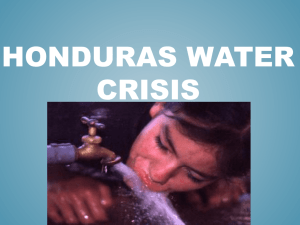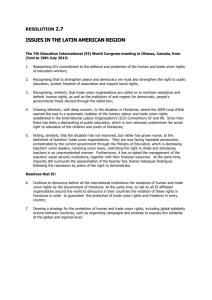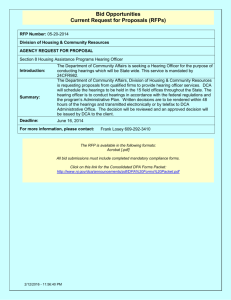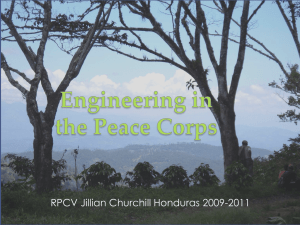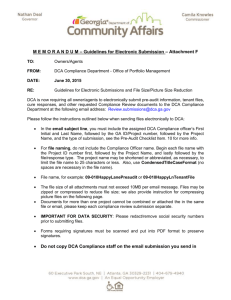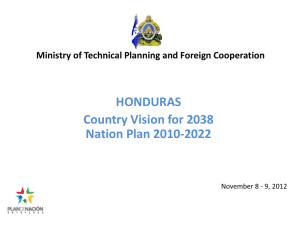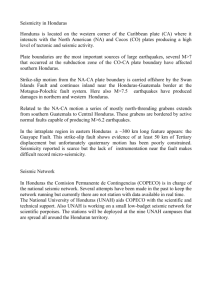06 - DanChurchAid Honduras
advertisement
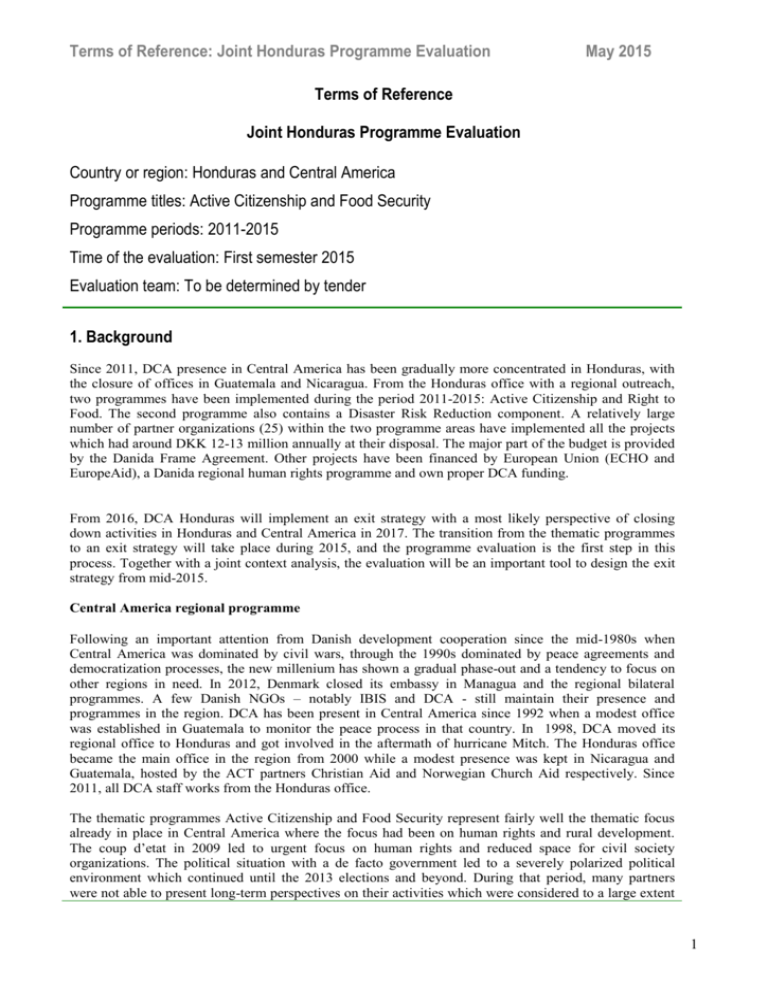
Terms of Reference: Joint Honduras Programme Evaluation May 2015 Terms of Reference Joint Honduras Programme Evaluation Country or region: Honduras and Central America Programme titles: Active Citizenship and Food Security Programme periods: 2011-2015 Time of the evaluation: First semester 2015 Evaluation team: To be determined by tender 1. Background Since 2011, DCA presence in Central America has been gradually more concentrated in Honduras, with the closure of offices in Guatemala and Nicaragua. From the Honduras office with a regional outreach, two programmes have been implemented during the period 2011-2015: Active Citizenship and Right to Food. The second programme also contains a Disaster Risk Reduction component. A relatively large number of partner organizations (25) within the two programme areas have implemented all the projects which had around DKK 12-13 million annually at their disposal. The major part of the budget is provided by the Danida Frame Agreement. Other projects have been financed by European Union (ECHO and EuropeAid), a Danida regional human rights programme and own proper DCA funding. From 2016, DCA Honduras will implement an exit strategy with a most likely perspective of closing down activities in Honduras and Central America in 2017. The transition from the thematic programmes to an exit strategy will take place during 2015, and the programme evaluation is the first step in this process. Together with a joint context analysis, the evaluation will be an important tool to design the exit strategy from mid-2015. Central America regional programme Following an important attention from Danish development cooperation since the mid-1980s when Central America was dominated by civil wars, through the 1990s dominated by peace agreements and democratization processes, the new millenium has shown a gradual phase-out and a tendency to focus on other regions in need. In 2012, Denmark closed its embassy in Managua and the regional bilateral programmes. A few Danish NGOs – notably IBIS and DCA - still maintain their presence and programmes in the region. DCA has been present in Central America since 1992 when a modest office was established in Guatemala to monitor the peace process in that country. In 1998, DCA moved its regional office to Honduras and got involved in the aftermath of hurricane Mitch. The Honduras office became the main office in the region from 2000 while a modest presence was kept in Nicaragua and Guatemala, hosted by the ACT partners Christian Aid and Norwegian Church Aid respectively. Since 2011, all DCA staff works from the Honduras office. The thematic programmes Active Citizenship and Food Security represent fairly well the thematic focus already in place in Central America where the focus had been on human rights and rural development. The coup d’etat in 2009 led to urgent focus on human rights and reduced space for civil society organizations. The political situation with a de facto government led to a severely polarized political environment which continued until the 2013 elections and beyond. During that period, many partners were not able to present long-term perspectives on their activities which were considered to a large extent 1 Terms of Reference: Joint Honduras Programme Evaluation May 2015 as political emergencies. This situation led to a high number of smaller projects, renewal of short-term agreements, often in an untimely procedure. The programme focus and partners during this period included: Thematic Program 1 (PT1): Active Citizenship, ”Promoting Poltical Inclusion” The purpose of the programme is to empower the most marginalized population groups to participate as citizens, as right-holders as political actors; increase accountability of State institutions and promote the protection and respect of human rights. Specifically, the following objectives were formulated: 1. Poor and marginalized population actively influencing duty – bearers for the progressive improvement in public response to their needs at local, sector and national levels. 2. The poor and traditionally excluded population making use of their rights to participate and decide their human, social and democratic development. 3. The poor and marginalized population with increased awareness and capacities for human rights defense and claim, and struggle against impunity. 4. DCA facilitates coordination, information, exchange and adequate support for organizational development and partner interventions that add value to the development of the programme. The partner organizations selected to achieve these objectives have been the following: In Honduras: Radio Progreso, El Libertador (2011-13) and Asociación para una Sociedad más Justa - ASJ (2011-13) in the area of alternative media, Asociación de Jueces por la Democracia - AJD, Las Hormigas, Centro de Derechos de la Mujer - CDM (2013-15), Convergencia del Norte (2013-15), Centro de Investigación y Promoción de los Derechos Humanos - CIPRODEH, Centro de Prevención, Tratamiento y Rehabilitación de las Víctimas de la Tortura y sus Familiares - CPTRT (2014), Centro de Estudios para la democracia - CESPAD (2014) and ACI Participa (2013-14) in the area of human rights and access to justice, and Foro Social de Deuda Externa y Desarrollo de Honduras - FOSDEH (2011-13) and IIPPICEFI (2014) in the area of fiscal justice. Following the coup d’etat in 2009, support was given to a Human Right Platform consisting of 6 major human rights organizations and their efforts to present an alternative Truth Commission Report in 2012. In Guatemala: Fundación Myrna Mack (2011-14), Equipo de Estudios Comunitarios y Acción Psicosocial - ECAP (2011-13), administrated by IBIS, both in the area of human rights and transitional justice At regional level: Centro por la Justicia y el derecho Internacional - CEJIL (in Costa Rica) and International Commission of Jurists (in Guatemala) in the area of access to justice and independent judiciary Thematic Programme 3 (PT3): Food security The purpose of the programme is to support poor rural families and indigenous population, with a clear focus on the specific interests of women, in marginalized areas in Honduras, Guatemala, Nicaragua and El Salvador, with enhanced livelihoods for reduced food insecurity and vulnerability. Five specific objectives are have been outlined, and the fifth is related specifically to Disaster Risk Reduction: 1. Poor families in marginalized areas with capacities to increase family welfare 2. Poorest population groups with improved position and technical and organizational capacities to claim their right to sustainable livelihoods. 3. Civil society organizations and beneficiary groups acting to influence State policy and programs targeting the poor. 4. DCA and CA facilitate coordination, information, exchange and adequate support for capacity building and advocacy activities that add value to the development of the programme. 5. Increase in preparedness and response capabilities of poor and vulnerable populations in case of emergencies through climate change adaptation, disaster risk reduction and organizing for emergency response 2 Terms of Reference: Joint Honduras Programme Evaluation May 2015 The partner organizations selected to achieve these objective are: In Honduras: Comisión de Acción Social Menonita - CASM (2011-13), Asociación de Organismos No Gubernamentales – ASONOG, Asociación de Mujeres Indígenas Renovadas – AMIR, Organismo Cristiano de Desarrollo Integral de Honduras – OCDIH, Consejo Nacional Indígena Maya Chortí de Honduras, Unión de Trabajores del Campo – UTC, directly related to food security. In the área of disaster risk reduction, the main partners have been CASM and Centro de Desarrollo Humano – CDH (DIPECHO 7, 8 and 9). In addition, the DCA support to the ACT Forum has been managed from this program (201114). In Guatemala: Colectiva para la Defensa de los Derechos de la Mujer – CODEFEM (2011-14), administrated by Norwegian Church Aid (some more projects including EU financed projects finalizing in 2011-2012). At regional level: A Regional Consortium on Climate Change has been hosted by Centro Humboldt in Nicaragua (2011-13). By 2015, all projects in Guatemala have been phased out. Geographically, the partners in Honduras of both programmes are fairly concentrated in rural areas in the border regions with El Salvador and Guatemala (Intibucá, Lempira, Copán), as well as in San Pedro Sula/El Progreso area. This constitute an opportunity for a coherent country program. Possibilities of trans-border activities involving Guatemala and El Salvador are relevant. 2. Lessons learnt to date: Mid-term reviews of both programmes took place in 2013. The main findings can be summarized as follows: On Active Citizenship: An important part of Honduran civil society (including DCA partners generally) are reluctant to engage in dialogue with duty bearers, mostly at national level. Similarly, government is reluctant to respond to criticism and there is low accountability towards civil society and the people in general. Some public policy instruments on the issues of women and youth have been approved at local level in the western area as a result of advocacy activities carried out by DCA partners. Capacity building activities to social leadership (peasants, women) has led to increased participation at local level and reinforced social movement at local level. Some of the DCA partners have been actively adding to effective human rights protection mechanisms and strategic litigation on leading cases of human rights violations, including use of international human rights bodies like the Inter-American Human Rights System. Women’s organizations have provided legal assistance at local level for effectively attending gender related violence and intra-family problems. The Association of Judges for Democracy has continuously lead public discussions on independency of the judiciary and has been instrumental to establish a coalition against impunity and a popular base for rights based advocacy on national and regional levels. The GESCCA programme – consortium with IBIS, and supported through the Danish embassy in Bolivia - represents an adaptive initiative for fundraising and presents the added value of having a regional partnership and a possibility for increased awareness on programmatic issues and advocacy in Denmark. The programme has resulted in improved synergy among partners in coalition, and in partner portfolio beyond the coalition on strategies. Advocacy strategies tend to be narrowly focused on the most obvious local duty-bearers and could benefit from an amplified stakeholder approach (for example investment by international entities for 3 Terms of Reference: Joint Honduras Programme Evaluation May 2015 extracting industries and possibly actors dealing with international labour rights, especially ILO Convention 169 on indigenous rights). Some progress can be also remarked in capacity building activities for social leadership, which has reinforced social organization and participation at local level. In general terms, criteria for partner selection are not clearly defined. The importance of fundraising and opportunities on EU calls seized during 2011-2012, have influenced partner choices and related target groups, without clear strategic criteria that informed those choices. On Food Security: The three main contextual changes in the programme period were: The coup in 2009 that changed the political landscape and NGO space, the increased influence of drug trading and money laundering influencing food security through increased prices of land (and thus accessibility), and the increasing vulnerability to disasters in Honduras and in the region. The partners generally complement each other to fulfill all the programme objectives. However, the executive boards of most of the (generally faith based) NGOs, represented in the network ASONOG, consist largely of the same members, maintaining a relatively closed power circle with shared interests. There is a tendency to stick with long-term partners as they represent the core of the ACT Alliance in Honduras (CASM, OCDIH and ASONOG). ASONOG is an NGO network coordinating and strengthening advocacy between institutions. It might be useful to reassess the constituency the partners represent, to ensure legitimacy of their claims and political positioning, in the region and at a national level – or to reassess the partner portfolio to ensure diversity. Several innovative elements have been integrated into the projects: The drought Early Warning Systems, Strategic Grain Reserves, Community Savings and Loans Groups, Diversification of Livelihood strategies on family and community level and Focused advocacy on right to food issues on a municipal and intermunicipal level. On disaster risk reduction, DCA Honduras has over the past decade implemented 5 consecutive ECHO funded DIPECHO projects, mainly along the Caribbean northern coast, involving the Permanent Contingency Commission – COPECO, municipal authorities, partner organizations, neighborhood organizations, schools and other local organizations. 3. Purpose, objective and evaluation questions 3.1 The objective of the evaluation To assess the effectiveness and outcome of DanChurchAid’s thematic programmes in Honduras with a specific focus on their contribution to the reduction of inequalities and poverty for women and men, and of indigenous peoples. 3.2 The purpose To carry out a consolidated evaluation of DCA Honduras office current thematic programmes, (Active Citizenship and Right to Food) To use the findings, conclusions and recommendations of the evaluation to provide substantial guidance to the design of an exit strategy for Honduras and Central America. To provide findings that will feed into the Global Report and to DCA organisational learning. 4 Terms of Reference: Joint Honduras Programme Evaluation May 2015 3.3. DCA programme evaluation questions Relevance Key question: To what extent are the programme strategies relevant to the needs and priorities of target groups, including the structural causes of rights violations in the given context? To what extent are the programme strategies relevant to DCA’s strategic goals and priorities, relevant national policies and priorities, and in keeping with international human rights and humanitarian standards? To what extent is the programme portfolio relevant to the programme objectives? Sub questions: To what extent are the interventions aligned with international human rights and humanitarian law? To what extent are the interventions compliant with national and local frameworks that advance human rights and gender equality? To what extent were programme interventions informed by the needs and interests of discriminated groups among the extreme poor? To what extent was disaggregated data strategically used to ensure relevant targeting and interventions? To what extent were relevant barriers and causes to inequalities, discrimination, and impoverishment of the rights-holders addressed under the different programmes? To what extent ere the mechanisms for ensuring meaningful participation of and accountability to the targeted rights-holders relevant? What is the added value of DCA, and the programme approach (as opposed to project approach) in the two programmes? To what extent and how is there synergy and cohesion between the projects within and between the thematic programmes? In what way does the programme strategies contribute to the strategic goals of DCA (programme specific goals, the Rights Based Approach and Gender Equality goals) as per DCA´s international strategy for the period under evaluation? Effectiveness Key questions: 1) To what extent were the programme objectives achieved at outcome level (and if verifiable at impact level?) Sub questions: To what extent did the programmes´ theory of change (implicit or explicit) and/or results framework reflect a rights-based logic? To what extent were the participatory and accountability mechanisms used effective at reaching the rights-holders? To what extent have the interventions under all thematic programmes contributed to the empowerment of rights-holders to claim or access their rights and entitlements and of duty-bearers to fulfil their obligations? What results were achieved in terms of reducing the underlying causes of inequality and discrimination? How did programme activities contribute to this achievement? To what extent has the monitoring undertaken in the course of the programmes 5 Terms of Reference: Joint Honduras Programme Evaluation May 2015 provided management with sufficient information to follow progress towards the desired results? To what extent has monitoring been used in communication with beneficiaries? To what extent has DCA (RO and HQ) been an effective manager of the Honduras programmes (strategic planning, staffing, resource management, monitoring, partnerships, etc.)? 2) How have partnerships been enhanced as a result of the programmes? (DCA and partners, partners and rights holders, rights holders and duty bearers, and partners among themselves? Sub questions: Based on what criteria were the partners selected? What is their involvement and decision-making power in the planning and implementation of the programme, including the cross cutting activities? Do partner platforms fulfil their purpose as identified by the programme strategies? Has DCA´s support to partners’ capacity and organisational development been effective? Is DCA responsive to needs identified by partners? Does the support affect in a positive way the partners’ organisation and capacity to implement its projects? In view of DCA´s plans to stop its engagements in Honduras by 2017, how can DCA´s support to partner organisational development be enhanced during this period? Do the partners have the right skills, commitment and constituency to contribute to the achievement of the goals in the programmes? Has the programme approach contributed to the effectiveness of the partners? How effective has DCA been at strengthening partner´s strategic advocacy work e.g. through capacity-development, through facilitating links to decision-makers, networks, international fora etc.? Are there specific interventions in this area that DCA should upgrade or initiate in view of DCA´s exist from the region? Have the programmes stimulated relations between partners in any significant way? How has this affected the programme´s results and/or the partners´ organisations? Assess the extent to which a project or programme contributes to delivering DCA’s Accountability Framework, (HAP) in particular in relation to Benchmark 3 (Sharing information), Benchmark 4 (Participation) and Benchmark 5 (Handling complaints). Efficiency Key question: Has the programme approach been a cost-efficient way to implement development assistance? Sub questions: What are the overall costs of the two programmes compared to the number of rightsholders? How economically have resources been converted to results? Were the human and financial resources adequate for implementing the programmes? Is there any indication that a modest increase of resources to more effectively incorporate rights-based strategies would have contributed to a substantive increase in results? To what extent can one argue that the interventions were cost-effective and the resources used in an efficient way to reach the most discriminated groups and facilitate their effective participation and to address the rights issues identified in the 6 Terms of Reference: Joint Honduras Programme Evaluation May 2015 programme strategies? Were there challenges during implementation in addressing the human rights and gender equality concerns of the rights-holders and were resources used efficiently to address these challenges during implementation? Have programme activities adequately built on the assets and positive strategies of the targeted rights holders (men and women)? Have risks been properly identified and well-managed? With hindsight, what could have been done better in this regard? Impact Key question: What, if any, have been the wider social, economic, human rights and political impact of the programmes? Sub questions: What evidence is there that the interventions contributed to rights-holders increasing their enjoyment of their rights; of duty-bearers better performing their duties and obligations; and of accountability mechanisms being strengthened? What evidence is there that this has contributed to reducing inequalities and poverty at local or national levels? What evidence is there of changes in gender inequalities e.g. in access and use of resources, in decision-making, in division of labour etc.? Were there any unintended positive or negative results of the two programmes? Were there any unintended effects on groups not included in the intervention? Are the rights-holders targeted satisfied with the achievements (in terms of impact and process)? How many women and men have benefitted from programme activities? Sustainability To what extent have programmes furthered institutional changes (changes in laws, policies, practices, resource levels) for furthering human rights and gender equality? To what extent are these changes sustainable? To what extent has the intervention strengthened citizen claiming and monitoring of human rights and gender equality? To what extent is this likely to continue once the programmes end? To what extent has the programmes contributed to attitudinal changes that will further the protection of human rights and gender equality among the poorest after this intervention has ended? To what extent did the programmes managed to shift power balances and contribute to the redistribution of resources, power etc. to more discriminated/excluded groups? To what extent did the programme help in the strengthening and longer-term sustainability of partner organisations as organisations? Other context specific programme evaluation questions If country specific issues cannot be addressed in the sections above, please make sure they are addressed through additional relevant questions here. The way forward 7 Terms of Reference: Joint Honduras Programme Evaluation May 2015 Key question: What are the key recommendations for the design of an exit strategy? Sub questions: How can synergies between the thematic activities, partners, geographic areas and the local-national level be improved in the perspective of a broader and more effective ACT Alliance without DCA presence after 2017? Which innovative approaches and new technologies could be tested and shared with other agencies (ACI and ACT) in order to preserve added value of DCA contributions? Particularly on the effectiveness of linking up with Global Advocacy issues such as Climate Change, Shrinking Democratic Space, Increasing inequalities (between individuals, rural-urban and countries worldwide) what can be done as part of an exit strategy and how could that flow into other forms of commitment and follow up without a DCA presence in CA? Please provide recommendations for a gradual phase out of projects and partners in the frame of an Exit Strategy, including specific proposals on how DCA can in the remaining period effectively support partners organisational development and sustainability as a contribution to civil society development in Honduras What elements/activities could/should be enhanced, documented and systematized in order to sustain the benefits and results of the current programmes even after DCA´s exit? 4. Scope The evaluation assignment is planned to take place during a total of 25 days within the period June 20 and August 15, 2015, including delivery of the first draft report. The tender should specify the activities within this time span. The evaluation will seek to visit the following areas: The two major Honduran cities Tegucigalpa and San Pedro Sula/El Progreso and the departments of Intibucá, Copán and Colón. San José, Costa Rica and Guatemala City The evaluation will cover the following projects and activities in terms of assessing the extent to which the results created at project and activity level has contributed to the achievement of the objectives of the thematic programmes. CEJIL (Costa Rica): Access to justice and human rights CIJ (Guatemala City): Access to justice Fundacion Myrna Mack (Guatemala City): Access to justice Radio Progreso (El Progreso): Alternative media and human rights AJD (San Pedro Sula): Access to justice CIPRODEH (Tegucigalpa/Santa Rosa Copán): Human rights and citizen security Las Hormigas (La Esperanza): Women’s rights CDM (Tegucigalpa): Women’s rights ASONOG (Santa Rosa Copán): Right to food AMIR (La Esperanza): Women’s rights and right to food CONIMCHH (Copán): Indigenous peoples’ rights OCDIH (Copán): Right to food ACT Forum (Tegucigalpa): Disaster risk reduction and joint activities 8 Terms of Reference: Joint Honduras Programme Evaluation May 2015 CDH (Tegucigalpa): Disaster risk reduction CASM (San Pedro Sula): Disaster risk reduction and food security UTC (Marcala): Right to Food Specify criteria for selecting projects: The partners and projects represent all long-term engagements of DCA in Central America, leaving out smaller and short-term projects 5. Method It is expected that the consultants will further develop the methodology to be applied within this consultancy but the below key elements should guide the development of the proposed methodology. The tender will determine the desired composition of a team. DCA Honduras staff will be available for consultations. It will be up to the team leader to design and facilitate the process and to conduct independent interviews and exercises. It will also be the responsibility of the team leader to draw the final conclusions and recommendations. Participatory methodologies must be employed to ensure that the rights holders targeted by the programmes effectively participate in the evaluation process. The method developed must also be gender and culture sensitive and it must describe how it fits the purpose of the evaluation. In the data collection and analysis phase the tender can use both qualitative and quantitative data collection. The methodology should allow for collection of data from multiple sources, like document review, stakeholder interviews, focus group discussions, participatory workshops. Special attention should be given to the implications and effects of the initiation of an Exit Strategy instead of an integrated Country Programme which had been envisioned during the 2014 Partner Dialogue (Partner Platforms and Partnership Agreements) Please refer to annex 1 for a list of available documentation 6. Team composition The evaluation team is expected to consist of a team leader and local consultants, preferably from the country or region. The team leader should possess the following expertise: Proven team leader skills Extensive experience with evaluations, reporting and design processes, including skills such as indicator development, sampling, participatory evaluation methodology, appreciative enquiry methods, focus group interviews, etc. Experience with multi-sectorial evaluations Experience with exit strategies and phasing out programmes. Proven experience from NGO and CBO based development assistance in X country Proven expertise on the cross cutting issues such as Rights Based Approach and Gender. Experience with faith based organisations in general and DCA in particular is an asset Further, the team as a whole should have proven expertise in the following areas Active Citizenship (human rights, access to justice, local governance, gender issues, anti- 9 Terms of Reference: Joint Honduras Programme Evaluation May 2015 corruption and social audit, alternative media, political advocacy and monitoring) Right to Food (food security, and disaster risk reduction). Organisational accountability and capacity development 7. Output A detailed evaluation methodology and matrix A brief debriefing note on the most significant findings and recommendations to be discussed in a debriefing session with the Regional Office An evaluation report in 1-3-25 format (see evaluation guideline) 10
